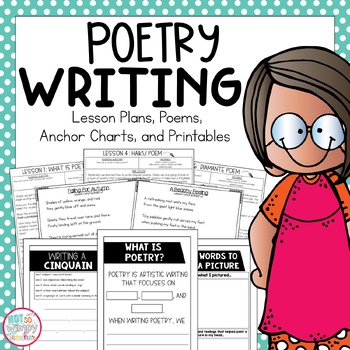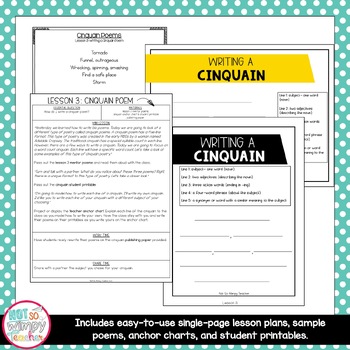Poetry Writing Unit
What educators are saying
Description
This unit has a total of 14 poems, teacher and student anchor charts, and 10 days of lesson plans to assist your students in learning all of the necessary skills to write six different types of poetry. Students will read and learn about Bio-poems, Cinquains, Haikus, Concrete Poetry, Diamantes as well as Free-Verse poetry. Next, they can take the skills they learned to create their own collection of poetry! This is a great unit to start off the school year. However, it can be used at any point in the school year to give your students the opportunity to express themselves through poetry.
This unit is intended to be used over a two-week time frame, but this can easily be adjusted to meet your needs.
This unit was written with 3rd and 4th grade in mind. I suggest looking over the preview to determine if it is a good fit for your specific class.
Included in this unit:
- Detailed teacher directions and suggestions for simple implementation
- 10 days of lesson plans that include guiding questions, materials, mini lessons, student work tasks, and student share tasks
- 14 original poems covering 6 types of poetry (These will be used for mini lessons and student tasks)
- 14 teacher anchor charts (blank and filled in versions)
- 11 Student anchor charts and printables
- Publishing paper
- NEW!!! Digital Writing Notebook with student anchor charts on Google Slides
Lessons Included:
- What is Poetry?
- Writing a Bio-Poem
- Writing a Cinquain Poem
- Writing a Haiku
- Writing a Concrete Poem
- Writing a Diamante
- Writing a Free-verse poem
A Typical Day:
Mini Lesson:
The unit includes 10 lesson plans with a suggested mini lesson. The lessons include the use of poetry (that are included in the unit) and anchor charts. Teacher versions of the anchor chart are included in the unit so that the teacher can project them and fill them out with the class, or print them and display them in the classroom. Small versions are included for the students to fill out and keep in their writing notebooks as a reference and to help draft their essay.
Work Time:
Students will be applying the skill from the mini lesson into their writing each day. The students will be writing their own poetry during this time.
Share Time:
Lesson plans include a specific task for students each day that allows them to share some piece of their writing with a partner or with the class.
How can I use this resource in my classroom?
There are many ways that this resource can be used. Here are some ideas:
- Whole group reading lesson
- Reading small group lesson
- Writing workshop
Please let me know if you have any questions.
*******
More writing units:
Compare and Contrast Nonfiction
Second Grade (Narrative, Opinion & Informational)
Third Grade (Narrative, Opinion & Informational)
Fourth Grade (Narrative, Opinion & Informational)
Fifth Grade (Narrative, Opinion & Informational)
*******





